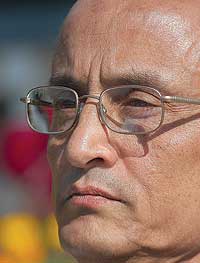After more than two decades as a pilot for Royal Nepal Airlines, PJ Shah went to fly for Emirates in 1987 when that airline was still using 727s. Today, it is one of the world's top operators. A passionate pilot who takes aviation seriously, Shah has kept coming back to his beloved Nepal. In a candid talk with Nepali Times, he reminisces about the good old days and has some pointers for the future.
 Nepali Times: Why do you think Royal Nepal Airlines is in the state it is in?
Nepali Times: Why do you think Royal Nepal Airlines is in the state it is in?
PJ Shah: The rot began with government interference, and this grew after multiparty democracy. If RNAC had been allowed to function independently, the management would have been more responsible. The government's high-handedness never allowed airline executives to really demonstrate their calibre. They showed their capabilities and professionalism when they moved to private airlines.
Is that why you quit to join Emirates?
It wasn't dissatisfaction with RNAC. Let me be frank, one of the main incentives was financial. Professional pilots were better paid in the international market. At that time, in 1987, RNAC was doing pretty well, despite some internal politics: there were people appointed by the royal palace, the prime minister and ministers. I felt that was unnecessary. Those who were responsible should have been made accountable. Responsibility without accountability does not make sense. That is why we are stuck where we are. We began jet operations with Boeing 727s in 1972. Emirates leased their first jets only in 1985.
They say Royal Nepal reflects the state of the country.
True, you can't compare RNAC with Emirates. The rulers and the people of the UAE are all involved in some kind of business. They have a culture of excellence. They proved that nothing is impossible. The success of Emirates airlines and Dubai are correlated. They go hand in hand. The same model can be replicated in Nepal. If the leaders want that to happen, the idea would work here as well.
How are Nepali workers faring in the Gulf?
To help Nepalis in Dubai, we established a committee with HMG that will lobby for their cause. Hundreds of Nepalis come to the Middle East every day and suffer terrible hardships. More than half are labourers, they do not receive what they were promised and the facilities are not in accordance to the agreements they signed. I have seen 30 Nepalis sleeping in a room barely enough for two small cars. These are the people who prop up our economy. Had it not been for them, Nepal would have become bankrupt. Every year they send home Rs 60 billion in remittances.
These workers don't deposit their hard-earned money in local banks in Dubai, they send it home as soon as they earn it. Sadly, the recently concluded NRN conference downplayed the issue of Nepali labourers abroad. All the participants understood their value and yet, their contribution to the economy did not get enough attention. The meeting only focused on how they could lure investments to Nepal from the diaspora. Sure, Nepalis should whip up big investment schemes, but we must not forget the 500,000 Nepali migrant workers who send money home on a regular basis.
What else happened at the NRN conference?
The conference basically aimed at setting policies for non-resident Nepalis. For people like me, who have Nepali passports, there aren't many problems. But, for those who don't, they face many hassles when they come back to their motherland. Therefore, we believe if NRNs are provided with special identity cards, they will have easy access. But, I have a serious reservation about the way the term NRN has been defined. The definition says if Nepalis spend 182 days in foreign countries, they can be called an NRN. If you travel to the US for six months, can you call yourself an NRN? Only those who stay abroad for work should be defined as NRNs.
What did the conference achieve?
It was something the government should have done long ago. But it promised that it would make rules for NRNs. I believe it will happen. There wasn't sufficient discussion on Nepali migrant workers in the Gulf. Any future policy must include them and recognise their sacrifice and contribution.


